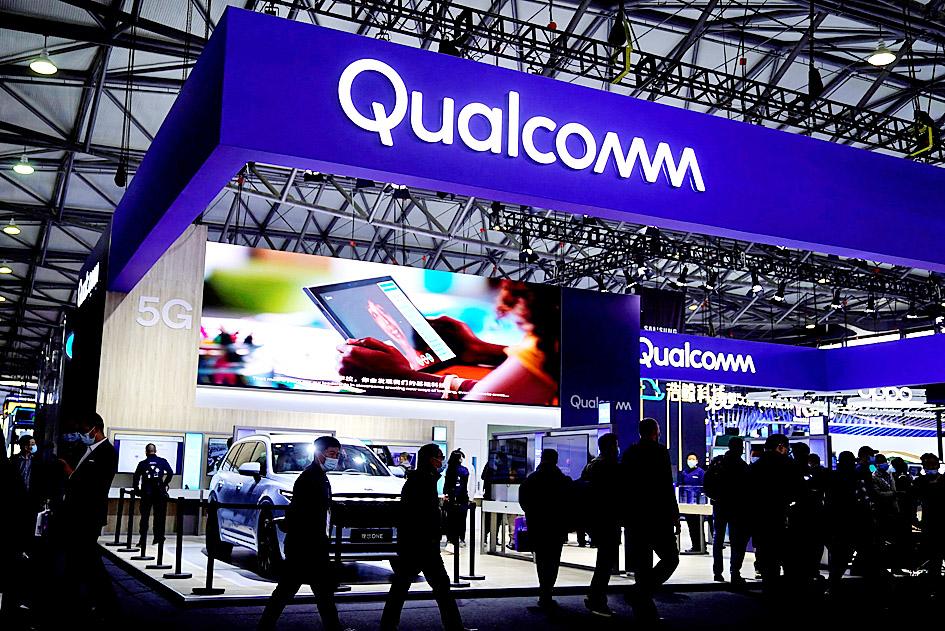Qualcomm Inc yesterday said it would maintain its supply chain strategy of sourcing chips from multiple foundry partners, including advanced chips from two major suppliers, to ensure a sufficient chip supply amid the COVID-19 pandemic.
Qualcomm is reportedly working with Taiwan Semiconductor Manufacturing Co (TSMC, 台積電) and Samsung Electronics Co on advanced products, such as 4-nanometer chips, for its new flagship 5G chips, the Snapdragon 8+ Gen 1 series.
Qualcomm is sourcing chips made by mature technologies from several foundry partners, the company said.

Photo: Reuters
Alex Katouzian, general manager of Qualcomm Technologies Inc’s mobile, compute and XR business, told a virtual media briefing that the strategy helped the firm deal with a chip shortage.
Qualcomm Technologies is a wholly owned subsidiary of Qualcomm.
Addressing concerns over weakening smartphone demand amid a slowing global economy and its ripple effects, Katouzian said a transition similar to the one from 3G to 4G is taking place in the transition from 4G to 5G, adding that the 5G penetration rate would keep growing.
DIFFERENT CONDITIONS
“Obviously, we are in a slightly different circumstance with the pandemic,” Katouzian said. “We see the penetration of 5G being extremely strong... We see a continuous growth path for 5G and the handset market as well.”
The company said demand for the overall smartphone market remains strong.
“There is some slowdown obviously because of the circumstances we are going through,” Katouzian said. “But we anticipate things to pick back up, but definitely not disappearing. We see still strength in the market, for sure.”
Qualcomm’s comments followed an optimistic MediaTek Inc (聯發科) projection about the 5G trend.
MediaTek expects the 5G penetration rate to rise to 50 percent this year, compared with 30 percent last year.
However, unlike MediaTek’s conservative view about the adoption of the millimeter-wave system due to costly base station deployment, Qualcomm expects the adoption rate to rise, citing its expanding use in a wide range of devices beyond smartphones and PCs, such as wearables, vehicles and XR headsets.
WI-FI 7 ADOPTION
Qualcomm also expects the adoption of new-generation Wi-Fi 7 technology to account for 10 percent of all devices next year or in 2024.
The company is shipping Wi-Fi 7 chips to customers and expects to see end products equipped with the chips by the end of this year, Rahul Patel, general manager of Qualcomm Technologies’ connectivity, cloud and networking business, said yesterday.
“You can see the Wi-Fi 6 adoption rate and how fast the ramp was. We anticipate Wi-Fi 7 to see a similar uptick in those adoptions,” Patel said, expecting a majority of premium Android smartphones to adopt Wi-Fi 7 technology next year.
This year, global shipments of devices equipped with Wi-Fi 6 technology would rise to more than 2.3 billion, Patel said.

Vincent Wei led fellow Singaporean farmers around an empty Malaysian plot, laying out plans for a greenhouse and rows of leafy vegetables. What he pitched was not just space for crops, but a lifeline for growers struggling to make ends meet in a city-state with high prices and little vacant land. The future agriculture hub is part of a joint special economic zone launched last year by the two neighbors, expected to cost US$123 million and produce 10,000 tonnes of fresh produce annually. It is attracting Singaporean farmers with promises of cheaper land, labor and energy just over the border.

US actor Matthew McConaughey has filed recordings of his image and voice with US patent authorities to protect them from unauthorized usage by artificial intelligence (AI) platforms, a representative said earlier this week. Several video clips and audio recordings were registered by the commercial arm of the Just Keep Livin’ Foundation, a non-profit created by the Oscar-winning actor and his wife, Camila, according to the US Patent and Trademark Office database. Many artists are increasingly concerned about the uncontrolled use of their image via generative AI since the rollout of ChatGPT and other AI-powered tools. Several US states have adopted

KEEPING UP: The acquisition of a cleanroom in Taiwan would enable Micron to increase production in a market where demand continues to outpace supply, a Micron official said Micron Technology Inc has signed a letter of intent to buy a fabrication site in Taiwan from Powerchip Semiconductor Manufacturing Corp (力積電) for US$1.8 billion to expand its production of memory chips. Micron would take control of the P5 site in Miaoli County’s Tongluo Township (銅鑼) and plans to ramp up DRAM production in phases after the transaction closes in the second quarter, the company said in a statement on Saturday. The acquisition includes an existing 12 inch fab cleanroom of 27,871m2 and would further position Micron to address growing global demand for memory solutions, the company said. Micron expects the transaction to

A proposed billionaires’ tax in California has ignited a political uproar in Silicon Valley, with tech titans threatening to leave the state while California Governor Gavin Newsom of the Democratic Party maneuvers to defeat a levy that he fears would lead to an exodus of wealth. A technology mecca, California has more billionaires than any other US state — a few hundred, by some estimates. About half its personal income tax revenue, a financial backbone in the nearly US$350 billion budget, comes from the top 1 percent of earners. A large healthcare union is attempting to place a proposal before